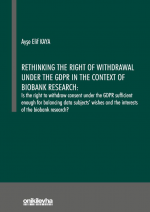 The right to withdraw consent is an essential component of research ethics and data privacy. However, it should be noted that biobank research differs from traditional medical research. This thesis analyses the right of withdrawal in biobank research and argues that the right of withdrawal under the GDPR is not sufficient for balancing the interests of the stakeholders. In order to make an analysis of the legal issues attached to the right of withdrawal under the GDPR, the first Chapter provides the legal background for processing personal data for biobank research. The second Chapter, identifies the impacts of the right to withdraw consent in biobanking. The final Chapter proposes alternatives for balancing the interests sufficiently and highlights the need for a harmonized legislation specifially for biobanking within the European Union.(ARKA KAPAKTAN)
The right to withdraw consent is an essential component of research ethics and data privacy. However, it should be noted that biobank research differs from traditional medical research. This thesis analyses the right of withdrawal in biobank research and argues that the right of withdrawal under the GDPR is not sufficient for balancing the interests of the stakeholders. In order to make an analysis of the legal issues attached to the right of withdrawal under the GDPR, the first Chapter provides the legal background for processing personal data for biobank research. The second Chapter, identifies the impacts of the right to withdraw consent in biobanking. The final Chapter proposes alternatives for balancing the interests sufficiently and highlights the need for a harmonized legislation specifially for biobanking within the European Union.(ARKA KAPAKTAN)
Table of Contents
Introduction
Motive
Research Question
CHAPTER 1
Biobank Research Under the GDPR
1.1. Lawful Grounds for Processing Personal Data Under the GDPR
1.2. Scientific Research Regime Under the GDPR
Legal Basis
Individual Rights
Adequate Safeguards
1.3. Consent Under the GDPR
1.4. Consent in Biobanking
1.5. Forms of Consent
Broad Consent
Dynamic Consent
Tiered/Meta-Consent
Conclusion
CHAPTER 2
Impacts of The Right to Withdraw Consent in Biobanking
2.1. Right of Withdrawal in Biobanking
2.2. Right of Withdrawal Under the GDPR
2.3. Impacts of the Right to Withdraw Consent
2.3.1. Conflict of Interests
2.3.2. Negative Impact on Research Results and on Future Research
2.3.3. Diminish the scientific recognition of the biobank
2.3.4. Hurdle for European Research
2.3.5. Impact on the Other Areas of Law
CHAPTER 3
Way Forward
3.1. Improving the Consent Model
3.2. Establishing an oversight body
3.3. Adopting De-Identification Techniques within Biobank
3.4. European Union-wide Legislation for Biobank Research
Conclusion
Bibliography
